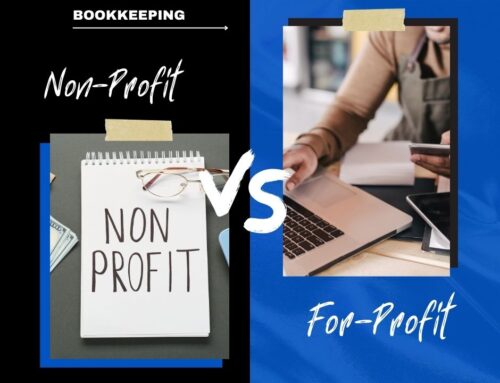Meticulous bookkeeping is crucial for nonprofit organizations because they must substantiate every penny received. Just like for-profit businesses, nonprofits must keep accurate, up-to-date financial records to ensure they comply with IRS tax laws and provide straightforward financial reporting to board members. Without the proper accounting tools and knowledge, tackling these tasks can become complicated and confusing to maintain. These 10 tips can help you better address some of the many aspects involved in nonprofit accounting.
1. Establish Written Procedures
Written accounting procedures help ensure tasks are consistently completed, which is essential when multiple people are involved in recording financial data. Provide clear instructions on how every financial transaction must be carried out, and include any segregation of duties between personnel. Following accounting procedures makes it more likely your financial statements conform to Generally Accepted Accounting Principles (GAAP). Even if your nonprofit is so small that you’re running it yourself, putting accounting procedures in writing makes it easier to train new people as your nonprofit grows.
2. Follow GAAP for Nonprofits
Nonprofits must understand and use GAAP, which is a set of accounting rules the Financial Accounting Standards Board (FASB) and American Institute of Certified Public Accountants (AICPA) use as the foundation for a comprehensive set of approved accounting methods and practices. GAAP rules for nonprofits provide standardized rules for reporting information to create transparency for your donors and help the government determine whether your organization should retain its tax-exempt status. It’s unrealistic to expect an average nonprofit volunteer or employee to be an expert on GAAP and keep up with changes in accounting principles, which is a good reason to rely on nonprofit bookkeeping experts.
3. Understand Nonprofit Tax Laws
It’s also unrealistic to expect volunteers or staff to be tax code experts, but it’s vital to understand IRS regulations regarding 501(c)3 nonprofits. Despite being tax-exempt, nonprofits must file annual tax returns just like for-profit companies. The Internal Revenue Service won’t overlook errors simply because you didn’t understand what your tax exemption meant or know how to navigate specific nonprofit tax regulations and filing instructions. There are very strict rules on recording revenue and expenses, and nonprofit tax returns are often very complicated due to these rules. Hiring an experienced bookkeeper can help ensure the books are managed correctly, but nonprofits with in-depth financial reports should consider using a Certified Public Accountant (CPA) and/or a Chief Financial Officer (CFO) who can help get your organization ready for any upcoming audits.
4. Use Nonprofit Accounting Software
Keeping your bookkeeping on track is much easier with a computerized accounting system. Standard accounting software performs tasks like reconciling your bank accounts, tracking accounts payable and receivable, creating a chart of accounts, and recording transactions in your general ledger. Nonprofit accounting software can streamline and simplify budgeting and fundraising while using financial information to create documents specifically for not-for-profit organizations, including statement of cash flows, statement of financial position, and statement of activities. QuickBooks is commonly used to fulfill the accounting needs of small businesses and nonprofits.
5. Create an Annual Operating Budget
Regardless of your nonprofit’s size, you need an annual operating budget. Create a new budget each fiscal year for your board of directors to approve so they’ll understand the organization’s upcoming initiatives. Annual budgets are an essential tool to manage income and expenses for the coming year, which lets you strategically plan for financial decision-making. Your operating budget should be realistic and based on previous budgets and expenditures compared to your upcoming plans. Stick to your annual budgeting as close as possible, and review it periodically to ensure cash flow and expenses are working out as expected.
6. Keep an Eye on Finances
Tracking your budget also helps you keep an eye on your finances, which helps you assess your organization’s current financial health. You and your board of directors should look at the nonprofit’s financial reports each month to confirm incoming and outgoing monies match your budget. Financial management only works if you measure income and expenses with accurate, up-to-date financial statements. Whether someone handles your record keeping in-house or you outsource your bookkeeping, ensure current financial documents are always prepared before board meetings and routinely available for your personal perusal.
7. Properly Denote Fundraising Expenses
Fundraising events present unique challenges, and it’s easy to get wrapped up in the fun and forget about the importance of appropriate record keeping, including donor contributions and fundraising expenses. All revenue for authorized fundraising events is considered contributed income and should be listed as a revenue line item in your chart of accounts. Fundraising revenue must be kept separate from other kinds of revenue like cash contributions or events counted as earned revenue, such as classes or seminars. Money raised at fundraisers for unrestricted use should be reported separately in your Statement of Activities.
Fundraising expenses are reported on your Statement of Functional Expenses under supporting activities, not program services, and are often reported incorrectly or underreported. Some fundraising activities that qualify as expenses include fundraiser advertising, postage and printing for mailing fundraising materials and similar event activities. Other tasks not directly tied to an event are also classified as fundraising expenses, such as paying advisory groups to develop fundraising strategies, expenses associated with preparing grant proposals and brochures sent to donors about bequests.
8. Account for Donated Time/Materials/Services
Nonprofits may keep excellent track of donated dollars but forget about tracking in-kind donations that can include tangible and intangible assets like time donated by volunteers and/or materials or services donated for fundraisers, resale, community events or other activities. Keep track of volunteer hours and multiply them by the current value of a volunteer hour to show the value of all time donated to your nonprofit. Ask donors to supply you with a value of donated materials and services because you’re not allowed to determine these values yourself. Include the value of donated time, materials and services in your operating budget to demonstrate what it truly costs to run your organization.
9. Keep Personal and Nonprofit Funds Separate
It’s imperative you keep your personal funds and the nonprofit’s funds separate from each other. Commingling funds makes your bookkeeping more complicated and can cause grief for your nonprofit with the IRS and State Attorney General’s office. Get a separate credit card for the nonprofit instead of using your personal card or one of the board member’s cards. Create a written policy telling volunteers and staff they can’t use the nonprofit’s credit card for personal purchases, then repay the nonprofit later. Keeping personal and nonprofit funds separate gets a bit trickier when your nonprofit offices are at your home or you use your personal property, such as a personal vehicle or storage building, for nonprofit programs.
10. Get Trusted Nonprofit Bookkeeping Services
Nonprofits often focus on their causes rather than their bottom line, but you must closely scrutinize your financial data to improve your organization’s efficiencies and meet funding requirements. Outsourcing your nonprofit bookkeeping tasks can save your nonprofit time and money and better prepare you for tax time. When you need reliable nonprofit bookkeeping services, turn to the experts at Navitance.
Navitance is one of the top-rated nonprofit bookkeeping firms serving clients throughout the United States. We help new or established nonprofits of all sizes and offer the flexibility and scalability to meet specific bookkeeping needs or take over all your financial record keeping. Contact us at 978-809-3282 to learn more about our nonprofit bookkeeping services or request a consultation.





